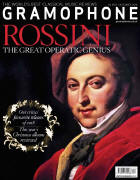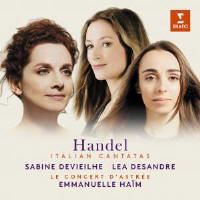Texte paru dans: / Appeared in: |
|
|
Outil de traduction (Très approximatif) |
|
|
Reviewer:
Richard Wigmore The Arcadia evoked in Handel’s Italian cantatas can be a pretty cruel and cynical place, especially if you’re an amorous swain. Time and again the assorted Tirsis, Filenos and Dalisos pine in vain for their heartless Amarillis and Cloris. Aminta e Fillide – an unstaged miniature opera for two voices – is a rare case where the man gets lucky. Having determinedly set herself against Cupid’s wiles, the shepherdess Fillide is finally won over by the shepherd Aminta’s sheer constancy. Here, for once, Arcadia lives up to its billing. Heard here in the expanded version Handel prepared for performance in the Marquis Ruspoli’s sumptuous gardens in July 1708, Aminta e Fillide is one of the most enticing, melodically piquant works from his Italian years. As with so many of his Italian cantatas, Handel lovers coming to Aminta e Fillide for the first time are likely to have a pleasurable sense of déjà entendu. Never one to waste a good idea, he was quick to recycle many of the cantata’s arias, first in his Venice opera Agrippina, then in his early London works. Aminta’s lament ‘Se vago rio’, hovering hauntingly between major and minor, became the Sirens’ Song in Rinaldo, while Fillide’s blissful final ‘Non si può dar un cor’ morphed into a pastoral aria in the Ode for the Birthday of Queen Anne. Handel composed Aminta e Fillide for two sopranos, one of whom was the young Margherita Durastanti, Ruspoli’s house singer whose association with Handel endured for over a quarter of a century – easily a record. Previous recordings of this delectable work have likewise used a pair of sopranos, notably Gillian Fisher and Patrizia Kwella in the recording directed by Denys Darlow (Hyperion, 12/84), and Nuria Rial and Grazia Schiavo with La Risonanza (Glossa, 12/08). Even allowing for the inevitable lure of novelty, neither of those versions quite matches the vocal lustre and theatrical flair of this Erato recording, cast with a soprano and mezzo. Both singers have unblemished voices of beautiful quality: Sabine Devieilhe, as Aminta, pellucid and free-soaring, Lea Desandre with a dark flare in her high mezzo. They contrast more sharply than their counterparts on the rival recordings, yet blend exquisitely in the final duet in praise of compassion and fidelity. From Aminta’s increasingly desperate plea to the fleeing Fillide, ‘Fermati, non fuggir’, Devieilhe and Desandre trace a riveting emotional journey, capturing every nuance in music and poetry without exaggeration or gratuitous ‘effects’. They interact vividly in recitative, and in their arias strike an ideal balance between refinement and dramatic intensity. A shift of sentiment in the ‘B’ section of an aria is always a cue for a new vocal colour, while in the da capos both singers use ornamentation to heighten the expression rather than merely for display. Outstanding in a succession of vocal highlights are Desandre’s capricious ‘Fu scherzo, fu gioco’ as she blithely denounces Cupid, and Devieilhe’s unearthly floated line in ‘Se vago rio’. All the while the players of Le Concert d’Astrée, under Emmanuelle Haïm’s animating direction, are far more than mere accompanists, not least in the gusto with which they second Aminta’s avowal of eternal fidelity in ‘A dispetto di sorte crudel’. Playing words as well as tones, the crucial cello continuo is always acutely alive to singers and text. Moving from pastoral to tragedy, each singer gets her own, searing solo cantata, separated by a light-footed performance of Handel’s B minor Trio Sonata that stresses the vocal nature of its inspiration. With her limpid timbre and grace of line and ornament, Sabine Devieilhe touchingly embodies the abandoned Armida’s vulnerability and pathos. Her sublime final siciliano emerges as a true catharsis, with solo violin as an agent of consolation. Less predictably, perhaps, Devieilhe summons the Furies with vehement attack and a cutting edge to her tone, abetted by seething, scything strings. With a comparably brilliant coloratura technique, Lea Desandre is just as thrilling in Handel’s more flamboyant invocation to the Furies in the continuo-accompanied La Lucrezia, most violent and dissonant of all his Italian cantatas. In symbiotic partnership with Atsushi Sakaï’s cello, she spins a pure and eloquent line in her two grieving arias; and with subtle control of vibrato she movingly conveys a sense of Lucretia’s ebbing life in the arioso ‘Già nel seno’, before rousing herself for a final savage denunciation of Tarquinius. Reviewers are paid partly to look for trouble. There simply isn’t any, in a disc that even amid fierce competition is a Handelian winner. |
|




